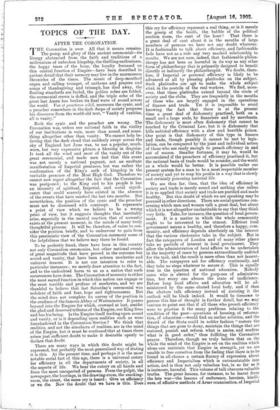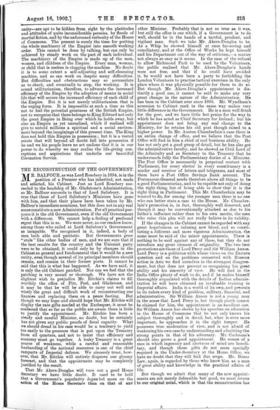TOPICS OF THE DAY.
AFTER THE CORONATION.
Both the cynic and the preacher are wrong. The Coronation was, unless our national faith in the virility of our institutions is vain, more than sound, and some- thing altogether other than vanity. We cannot help be- lieving that the dark cloud that suddenly swept across the sky of England last June was, to use a popular, much- worn, but very expressive phrase, a blessing in disguise. It took all the wind and most of the vanity out of the great ceremonial, and made men feel that this event was not merely a national pageant, not an exultant manifestation of Imperial greatness, but was rather the confirmation of the King's oath of kingship in the veritable presence of the Most High God. Therefore we cannot now regret altogether the fact that the Coronation was postponed ; to the King and to his people it has an intensity of spiritual, Imperial, and social signifi- cance that could scarcely have existed in the absence of the events that have marked the last two months. But nevertheless, the position of the cynic and the preacher must not be dismissed with contempt. It represents a point of view which we believe to be a wrong point of view, but it suggests thoughts that inevitably arise, especially in the mental reaction that of necessity exists at the present moment, in the minds of many truly thoughtful persons. It will be, therefore, of value to con- sider the position briefly, and to endeavour to gain from this pessimistic view of the Coronation ceremony some of the helpfulness that we believe may there be found.
To be perfectly frank, there have been in this country not only Coronation ceremonies, but other national events of great magnitude that have proved in the outcome but sound and vanity, that have been solemn mockeries and unlearnt lessons. It is not our intention to refer to particular instances ; we merely draw attention to the fact, and to the undoubted harm to us as a nation that such occurrences have done. The Coronation of necessity is either the most sacred function in which this nation can engage or the most terrible and profane of mockeries, and we are thankful to believe that last Saturday's ceremonial was redolent of faith and fear, hope and righteousness. But the mind does not complete its survey of the position in the confines of the famous Abbey of Westminster. It passes beyond into the Empire for which, crowned at last, amidst the glad and deserved tributes of the Empire, our King lives and has his being. Is the Empire itself feeding upon sound and vanity, or is it depending upon realities such as were foreshadowed in the Coronation Service ? We think that realities, and not the simulacra of realities, are in the mind of the Empire, but it must be confessed that at times there arises just sufficient doubt to make it desirable openly to declare that doubt.
There are many ways in which this doubt might be expressed, but probably the most generalised way of stating it is this. At the present time, and perhaps it is the most notable social fact of this age, there is a universal outcry for efficiency in all the departments of society, in all the aspects of life. We hear the outcry on all hands and from the most unexpected of persons. From the pulpit, the newspaper, the hustings, in the drawing-room, the smoking- room, the street, the same cry is heard : Give us efficiency or we die. Now the doubt that we have is this. Does this cry for efficiency represent a real thing, or is it merely the gossip of the booth, the babble of the political auction room, the cant of the hour ? That there is a great deal of cant about it in the mouths of large numbers of persons we have not any doubt whatever.
It is fashionable to talk about efficiency, and fashionable fads have not as a rule any very marked relationship to results. We are not sure. indeed, that fashionable philan- thropy has not been as harmful in its way as any other form of philanthropy that is primarily designed to benefit directly or indirectly the philanthropist. We doubt, there- fore, if Imperial or personal efficiency is likely to be _ advanced at all by pleasing platitudes on the subject. Such platitudes are apt to make the whole subject stink in the nostrils of the real workers. We find, more- over, that these platitudes extend beyond the circle of society and the clubs. They are frequently in the mouths of those who are largely engaged in the operations of finance and trade. Yet it is impossible to avoid knowing the fact that there is at the present time a great deal of dishonesty practised, both on a small and a large scale, by financiers and by merchants. The dishonesty is most often dishonesty that cannot be touched by the Criminal Law, but it is dishonesty that kills national efficiency with a slow and horrible poison. Our point is that dishonesty of this type in finance and trade, though possibly it cannot be met by legis- lation, can be conquered by the joint and individual action of those who are ready enough to preach efficiency in and out of season. Smaller fortunes, it may be, would be accumulated if the preachers of efficiency practised it, but the national basis of trade would be sounder, and the world as a whole would be better. It is possible under our present system for a man to be a most respectable member of society and yet to reap his profits in a way that is slowly and certainly poisoning national life.
We see thus far, then, that the idea of efficiency in society and trade is merely sound and nothing else unless it is so applied that society and trade are purified and made healthy. But this doubt of which we are speaking may be pursued in other directions. There are social questions con- cerning which men and women talk a great deal, but about which it is not altogether uncharitable to say that they think very little. Take, for instance, the question of local govern- ment. It is a matter in which the whole community ought to be interested to the utmost. Efficient local government means a healthy, and therefore a happy, com- munity, and efficiency depends absolutely on the interest that the various electorates take in the subject. But in fact the ratepayers of London and of many other places take no particle of interest in local government. They allow the administration of local affairs to be undertaken in the majority of cases by persons extraordinarily unfitted for the task, and the result is more often than not lament- able. The ratepayers ask for efficiency continually, and they take no steps whatever to secure it. This is equally true in the question of national education. Nobody cares who is elected for the purposes of administra- tion, but every one abuses the state of inefficiency. Before long local affairs and education will be ad- ministered by the same elected local body, and if then the electors talk efficiency instead of securing it the outlook will be black indeed. It would be tiresome to pursue this line of thought in further detail, but we may venture to point out that if all those who preach efficiency were to practise it the many problems relating to the condition of the poor—questions of housing, of reforma- tion, of education—would find an earlier solution, and the Sword of the State could in nobler fashion " restore the things that are gone to decay, maintain the things that are restored, punish and reform what is amiss, and confirm what is in good order," thus fulfilling the Coronation prayer. Therefore, though we truly believe that on the whole the mind of the Empire is set on the realities which alone can maintain that Empire in strength, yet we are unable to free ourselves from the feeling that there is to be found in all classes a certain fluency of expression about efficiency and Imperialism which is untranslatable into action, and is thus not only valueless but, in so far as it is insincere, harmful. This volume of talk obscures valuable truths. The great lessons, for instance, to be learnt from the late war—the lessons of endurance, heroism, kindli- ness, of effective methods of Army organisation. of Imperial unity—are apt to be hidden from sight by the platitudes and attitudes of quite inconsiderable persons, by floods of martial fiction, and by the unfocussed verbosity of the House of Commons. The present is surely the time for putting the whole machinery of the Empire into smooth working order. This cannot be done by talking, but can only be achieved by steady work on the part of each individual. The machinery of the Empire is made up of the men, women, and children of the Empire. Every man, woman, or child that is useless is clogging the machine. No doubt it is to some extent a self-adjusting and self-cleansing machine, and so can work on despite many difficulties. But difficulties and obstructions may so accumulate as to check, and eventually to stop, the working. It is sound utilitarianism, therefore, to advocate the increased efficiency of the Empire by the adoption of means in social life that will secure the increased efficiency of each child of the Empire. But it is not merely utilitarianism that is the urging force. It is impossible at such a time as this not to feel the potential greatness of the British Empire, not to recognise that there belongs to King Edward not only the great Empire in Being over which he holds sway, but also an Empire as yet unrealised, which if realised will give to untold millions a spiritual and a social environ- ment beyond the imaginings of this present time. The King does not hold this Empire in possession ; but it is a vested estate that will beyond all doubt fall into possession if he and we his people leave no act undone that it is in our power to do whereby we may realise the life-giving con- ceptions and aspirations that underlie our beautiful Coronation Service.



































 Previous page
Previous page